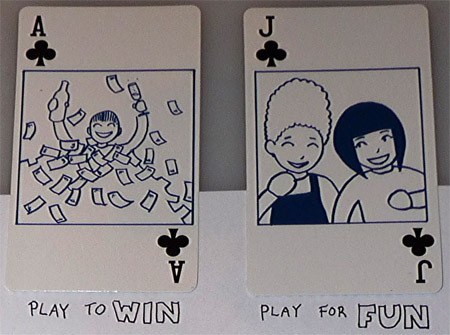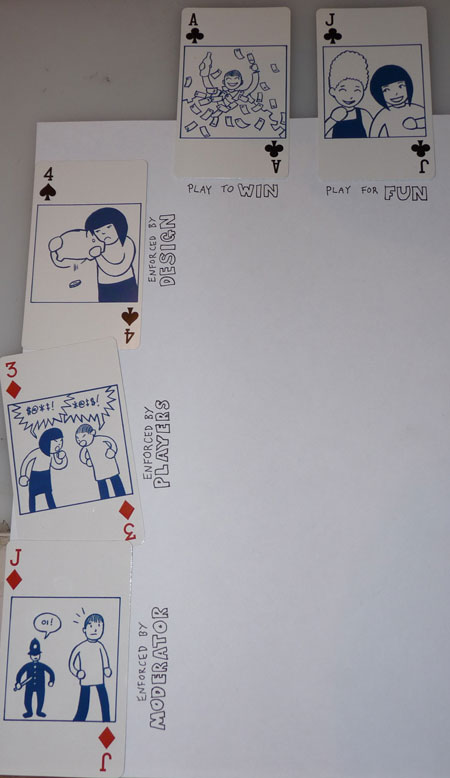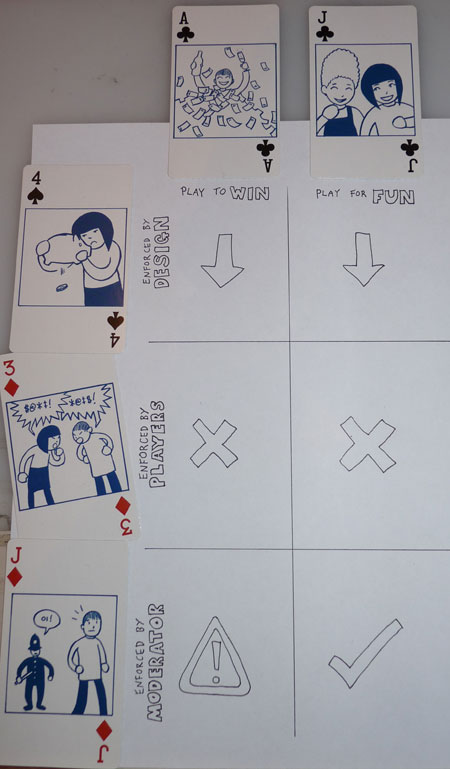For the same reason as in Part 1, these posts are illustrated using the Hand of Fate: Comic Strip Playing Cards by Karen Rubins. This is Part 2. Part 3 is here.
In the first part I explained how a sequence of games taught me to become comfortable with bluffing and even lying outright, from a position of not being able to do either. That’s simple. The harder question is this: what kind of games can teach you to bend or break rules?
To tackle that, we should probably step back and ask how games teach us anything. And to tackle that, we should probably make sure we have a working definition for a game.
Here’s one provided by Greg Costikyan (emphasis added):
A game is a form of art in which participants, termed players, make decisions in order to manage resources through game tokens in the pursuit of a goal.
Yes, something like that. From there it seems clear that playing with decisions in a game is how we learn. So the question becomes instead: what kind of game could let us play with the decision of whether or not to break rules?
Form or Content?
I don’t know of one, but I imagine you could make a game about cheating (in the rule-breaking sense, not just bluffing or lying). Perhaps players take the role of political factions within a Kafkaesque bureaucracy, with in-game costs and benefits for following or breaking in-game rules. Or it’s Moon colonists with competing sets of societal rules, struggling for domination while following or breaking the rule sets of the competing factions. Or, I wonder, do football simulations these days give you the option of going for a risky tackle, knowing that you risk a red card if it goes badly? I don’t know, but they certainly could.
But in the process of abstracting away the costs and benefits of cheating, it feels as if something gets lost. Just as making decisions in poker has a very different feel when real money is on the table, a game with a cheating theme seems far removed from the potential power of a game that is about cheating the very rules of the game itself.
So we want a game whose rules somehow give players interesting decisions to make regarding whether or not to follow those rules, which sounds like an almost Gödelian paradox. So let’s take a step to one side and look at exactly what it is that drives whether or not rules are followed in a game.
Game frameworks for cheating
There are two key dimensions to consider here, I think:
1) Do people play the game to win, or do they play it for fun? Perhaps more accurately, does the pleasure come from winning – or striving to do so – or just from taking part? There’s a spectrum here, of course, and players of the same game could be at different points along it. For the sake of simplicity we’ll assume it’s binary.

2) How are the rules enforced in the game?
- By design. In video games this is simple: the game should only let you do what you are allowed to do. Other kinds of games can also facilitate enforcement by their design – for example, playing a piece in Connect 4 makes a distinctive noise, so it’s hard to secretly take an extra turn if your opponent is briefly distracted.
- By the other players. In most well-defined tabletop or party games, it’s understood that the players are watching each other to ensure they all play by the rules.
- By a moderator. Generally speaking, if a game can’t work with either of the above approaches, it resorts to some kind of moderator who enforces the rules.
 Let’s take a look at how cheating works across the 6 kinds of game this framework implies, and in particular whether choosing to bend or break rules is an interesting* choice for the players to make.
Let’s take a look at how cheating works across the 6 kinds of game this framework implies, and in particular whether choosing to bend or break rules is an interesting* choice for the players to make.
I should probably define ‘interesting’ here. Let’s say that an interesting choice is somewhat balanced (one choice is not obviously better than another), not damaging to longer-term goals, and is fun. And then let’s not try to define ‘fun’ or we’ll be here all day.

Games Played to Win
Play to Win, Design enforced (e.g. PvP video games)
The rules are enforced by the design of the game. As a corollary, anything you can do ought to be allowed, since cheating is theoretically impossible. In reality, it’s not that simple.
A reasonably notorious example is ‘snaking’ in Mario Kart DS. By performing a particular manoeuvre when cornering you get a speed boost. For certain karts, you could perform this manoeuvre almost continuously, alternating left and right – ‘snaking’ – and you could gain more from those speed boosts than you lost by taking a wiggling route. This takes some skill and practice, which makes the benefit seem fair. And since it’s possible in the game, it should be permissible, even if it’s not clear it was the designers’ original intent.
In practice, however, snaking gives such a big advantage that a player that does it will almost always beat a player that doesn’t, no matter how skilled. People are playing to win – that’s what usually makes a race fun – but if even one player is snaking, anyone that can’t snake can’t win, and so, implicitly, can’t have fun. For that reason, the London DS meetup group I played with had a no-snaking rule, and I see on the internet that other groups did as well. Snaking was considered a kind of cheating, and nobody would want to play with you. So no-snaking becomes an informal rule, and this becomes effectively the same as Player Enforced Play to Win.
(You can dive much further into this topic with Sirlin’s “Playing to win” archives)
Play to Win, Player enforced (e.g. Chess or Go)
As noted by Kirk Battle in this Kill Screen article, players can apply a certain level of flexibility to how rules are enforced in a game like Magic: The Gathering, and get a better game as a result. But this is not a situation in which such ‘cheating’ represents an interesting choice.
In it’s more blatant form, cheating in these games will always be considered bad form, and if discovered can have bad social and future gaming consequences. Chess or Go (when played without an audience) fall into this category. A player would only choose to cheat if they thought the short-term advantage would outweigh the risk of long-term negative consequences if they were found out. That’s not a very interesting choice either, according to the criteria above.
Play to Win, Moderator enforced (e.g. Football, Tennis)
Cheating outside of the moderator’s sight gives an advantage, and can’t be stopped in this system. You’re playing to win, and if you don’t exploit this fact, maybe the other guys will.
We see this in competitive sports like football or tennis, and it seems to be (I say this as an outsider) a key part of the entertainment: arguing about whether something counts as a foul, which side of the line the ball bounced on, and in general whether or not the moderator’s decisions are accurate.
Does this mean there’s some scope here for a game that could teach us about cheating? It seems close, but if people are playing to win, it gets dangerous – some degree of violence attempted outside of the moderator’s views seems likely, so I’m going to disqualify this on the grounds of encouraging non-fun behaviour.
Games Played for Fun
Play for Fun, Design enforced (e.g. Endless MMOs)
If you (and everyone else) is playing for fun, things change. If something is possible, and makes for more fun, few can blame you. If you were (somehow) playing Mario Kart just for fun, and through a streak of bad luck found yourself in dead last by some margin, perhaps it would be okay to snake your way to 7th place – that would be more fun for all concerned.
In Kingdom of Loathing, a kind-of MMO in which fun is primarily derived from exploration, an ‘exploit’ was discovered to generate more meat (the game’s currency). Who could resist such an exploit? Why resist it? Could you really begrudge those that used it?
In the case of online games like this, the rules are enforced by design, but there’s also some moderation in the form of game updates and code changes in response to things like this. In this particular case, the exploit effectively crashed the game’s economy, which impacts everyone’s ability to have fun. (Brilliantly, this was fixed with the addition of some entertaining currency sinks, rather than some kind of hard rollback).
So cheating is kind of interesting here, but again becomes more about player- and moderator-enforcement, so strictly speaking this category is ruled out.
Play for Fun, Player enforced (e.g. Mornington Crescent, DDR)
At this point, what constitutes ‘cheating’ is massively dependent on the players: having fun is more important than the rules. We’re right on the edge of what constitutes a game here and it’s an area I think most adults struggle to give themselves permission to enter. The most well-known example I can think of in this category is Mornington Crescent.
Less directly, this arises in Dance Dance Revolution (aka Dancing Stage), in which (for the benefit of the one person reading this that doesn’t know) players must step on specific directional arrows in time to the music. On the arcade machines, a raised bar is supplied behind the player, ostensibly to prevent anyone from falling off the dancing platform backwards. At a high level of gameplay, working out how to shift your bodyweight between feet while meeting a high-speed series of instructions is part of the challenge. However, some players realised they could lean their weight back on the bar and tap away with their feet without worrying about this issue; this also uses less energy. Is this cheating? As could be expected, that depends on who is playing.
In both of these cases, the decision of whether or not to cheat tends to have very little riding on it, so is unlikely to be interesting.
Play for Fun, Moderator enforced (e.g. Schooner or Later)
The Moderator’s role is to ensure people have fun, arguably as a higher priority than ensuring that people follow the rules. In this context, you might ‘cheat’ but do so with the moderator’s implicit or explicit blessing; or you might try to cheat by hiding your action from or misleading the moderator, and since people are only playing for fun this shouldn’t lead to anything particularly harmful. With the right set of incentives and approach by the moderator(s), this could well provide a framework in which a decision to cheat is actually interesting.
In conclusion, returning to our grid of possible games, here’s what the options for learning to cheat look like in each:

This final category is where The Haberdashery’s Schooner or Later comes in, the game that led me to cheat in a manner that could only be described as brazen, and shocked me into this whole line of thinking. I’ll describe how exactly that came about in the third and final part of this series.
Tim Mannveille tweets as @metatim, and has previously not cheated in order to earn stickers he made up at the Edinburgh International Film Festival.